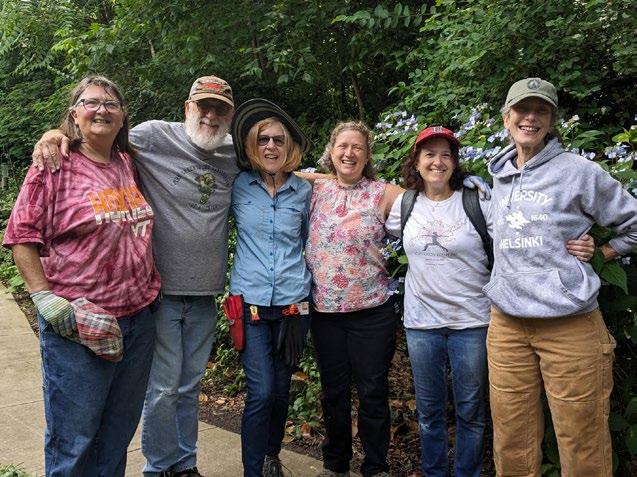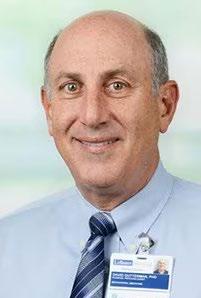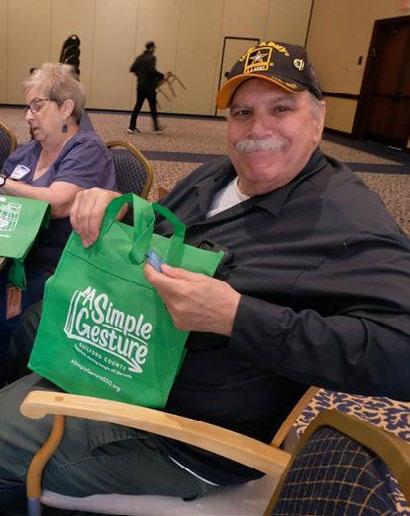
6 minute read
THE VOLUNTEER EFFECT:
THE HEALING POWER OF HELPING OTHERS
Securing a meeting with Dr. David Gutterman, Clinical Psychologist at LeBauer HealthCare, is not easy lately.
“My schedule runs a little tight these days,” he says with a laugh.
Since the start of 2025, Dr. Gutterman has seen a significant uptick in patients seeking therapeutic help for anxiety. Patients cite rising political tension, ongoing global conflicts, and an uncertain future as key reasons for their stress—sometimes, the only reasons.
“It’s unbelievable,” he says. “I’ve been practicing for 40 years, and I’ve never seen anything like this. And all my colleagues are saying the same thing.”

So, what does Dr. Gutterman advise his patients to do in times like this?
Go outside,” he says. “Get involved in something. Instead of sitting back and watching the news and getting an ulcer, find something you can do which speaks to you, that can make a difference in the world around you. In times of trauma, volunteerism can be very healing.
There are multiple reasons why this is the case, he says. Firstly, volunteering can help alleviate social isolation, which can be extremely damaging to human health. It also helps people who are struggling with their work or home life step away from those challenges, and focus their attention outwards, instead.
Finally, it contributes to something which psychologists have long known that humans need to be happy—a sense of purpose. “Having a direction, a reason for being, is vitally important for mental health,” Dr. Gutterman says.
“In our day-to-day jobs, we might serve people, but we don’t necessarily serve a ‘greater good.’ When we can find a way to do that, it adds another dimension of fulfillment altogether.”
Michele Gordon, a longtime volunteer for Jewish Family Services, has a phrase for this phenomenon: “warm fuzzies.”
In her 15 years volunteering for JFS, Gordon has done a bit of everything, from manning the front desk, to helping coordinate events. For the past couple of years, she led a group of volunteers as they cleaned inpatient hospice facilities for AuthoraCare Collective during Mitzvah Day.
I really enjoy doing it. It makes me feel so good, to feel like I’m doing my part to make the world a better place. Like, I’m leaving things a little better than when I found them,” she says.
Gordon’s career was service-oriented, as well. Before retiring, she was a school librarian, helping children access books and information. She has continued to help children by delivering food for Backpack Beginnings, a Greensboro nonprofit which gives resources to underserved families. She says that, while she primarily volunteers to help others, she finds it to be a rejuvenating experience, especially during difficult times.

“If I’m having a bad day, or if I’m a little off, when I go help someone else or deliver food to a school, everyone is so appreciative. That’s what life is all about, it’s being there for one another and helping one another. Like I said, it gives me warm fuzzies. It’s uplifting,” she says.
Lon Tytell is another seasoned volunteer who has devoted both his working life and his free time to helping others. During his career, he served in the military reserves and taught elementary school. In his off-hours, he volunteered with the Jaycees and Lion’s Club. In 2017, he moved from Warwick, NY to Greensboro, and has since helped Jewish Family Services, the Greensboro Jewish Federation, and Temple Emanuel with various service projects.
“Here’s what it does,” he says. “It gets me outside. It cures any depression. Plus, it also helps other people, who may also be depressed. So, it’s a two-way street. And it’s good for both of us.”
While living in Warwick, Tytell helped raise money for people with muscular dystrophy; helped fund a scholarship for local high school students; and organized a program which helped underprivileged children purchase clothing and toys during the Christmas holidays.
Most incredibly, he helped raise money for a device that would eventually save his own life.
“In 1978, representatives for the fire department, ambulance, and police came to our Jaycee meeting and said, ‘We need help raising money for this new device called the Jaws of Life, that can extricate people from car accidents.’ It took us about three years, but we got that Jaws of Life. And it saved a lot of people,” he says.
“Well, fast forward to November 2005. I was in an auto accident. And those same representatives from the ambulance, fire and police were there, and they helped extricate me from my car, saving my life with that machine.”

This story, he says, illustrates another benefit of volunteering: it helps one witness the tremendous amount of good that exists in the world.
“There’s just so many wonderful people out there,” he says. “You can’t be discouraged by negative news. You have to look at the positive, about how people all around you are willing to step up to make a difference.”
When asked whether he has witnessed a decline in general goodwill over the course of his long life, Tytell is optimistic. “I don’t think that’s the case. I think people actually help more, because they’re more aware of what’s going on,” he says.
Michele Gordon agrees.
“You’ve got to be hopeful. Find the joy and the optimism all around you. You know, one of the things I do is deliver food to our clients at JFS. You can just stop and have a conversation with them, and get to know them a little better. It just makes you feel good. It’s that connection with people, it’s being part of a community.”
So, what’s the best advice for someone who wants to start volunteering?
According to Dr. Gutterman: follow your heart.
“I recommend doing something which you feel a great passion for. Not something your neighbor or friend likes, but something that’s going to really touch you, personally. Try different things until you find something that really speaks to you,” he says.
As for Tytell, his advice is simple: don’t go it alone.
“All of these things that I’ve told you about, that wasn’t just me by myself,” he says. “You do it together. One person alone can help a little, but when you do it as a team, you can do a tremendous amount of good.”




